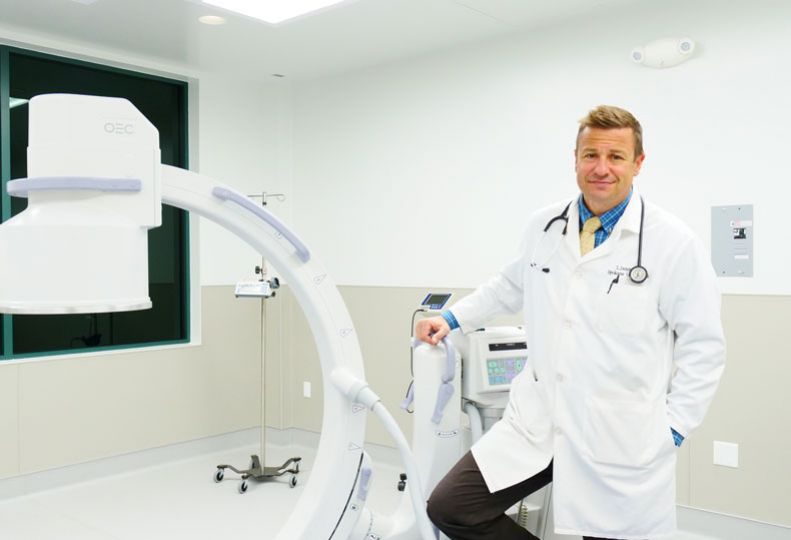
Home » Spokane Urology expands with demand
Spokane Urology expands with demand
Valley office opening is imminent; East Spokane surgicial suite eyed

December 1, 2022
A private-practice urology clinic in Spokane is establishing a Spokane Valley location and is building an outpatient surgery center at its main office in the Iron Bridge Corporate Campus, in East Spokane.
The two projects will have a combined cost of up to $7.5 million.
Dr. Levi Deters, a senior partner at Spokane Urology PS, says the 51-year-old urology specialty clinic is expanding to serve more patients as access to urological health care is hampered by a lack of providers.
“The average age of a urologist is around 58,” Deters says. “With the recent COVID pandemic, a lot of people have left urology. Because of the shrinking numbers of urologists, this specialty, more than others, has been facing burnout. It’s made coverage and access to care challenging.”
Deters says that Spokane Valley lost much of its access to urology care when a prominent urologist then practicing in the Valley, Dr. Robert Golden, retired during the height of the COVID-19 pandemic.
As of last week, Spokane Urology had planned to open its new Spokane Valley clinic Monday, Nov. 28. The new location is at 12525 E. Mission, across from MultiCare Valley Hospital. The space previously was occupied by Spokane Eye Clinic PS.
Ramey Construction Co., of Spokane, is the contractor on the remodel project at the Valley site, with a total cost of about $1.5 million.
The Valley clinic will provide the same services as the Spokane location, including treating kidney stones, cancers of the bladder and kidneys, prostate problems, and urinary incontinence. Four urologists work at the Spokane Valley clinic, as well as 21 employees who staff the clinic and the call center. Seven of those employees were hired specifically to staff the Valley clinic.
In total, the Spokane Valley clinic will occupy 10,500 square feet, of which 6,000 square feet will be dedicated to clinical use.
The remaining space will be used for administrative business, as well as a call center.
A call center is necessary to handle the volume of calls from patients seeking care. That volume rose significantly after the urology department at Providence Holy Family hospital closed in December 2021, Deters says.
Spokane Urology received about 1,200 phone calls per day for several weeks following that closure, Deters says.
To care for the sudden influx of new patients, Spokane Urology hired four urologists.
“By hiring additional providers, we were able to increase the telehealth access,” Deters says.
Spokane Urology currently has 10 urologists, as well as 75 advanced practice providers, which includes roles such as nurse practitioners and registered nurses.
Spokane Urology currently sees about 200 patients per day, and the volume of phone calls the clinic receives remains high, Deters says.
“I never thought, as a urologist, I would be so acutely aware of phones,” Deters says. “We’re now moving toward a different type of phone tree, but the volume of calls and the limitations of technology in different phone platforms continue to be challenges.”
Deters says additional expansion is possible for Spokane Urology, adding that he’d like the practice to expand to Spokane’s North Side.
Spokane Urology also plans to expand its services by opening an ambulatory surgery center in spring 2023 on the ground floor of the building the clinic owns and occupies in the Iron Bridge complex, at 1401 E. Trent.
The center will be in space formerly occupied by a Spokane office of the Illinois-based insurance company Allstate Corp. and Spokane-office of engineering company HDR Inc.
Designed by Spokane-based NAC Architecture, the improvements for the center are being completed by Ramey Construction and Milwaukee-based American Medical Buildings. Deters says the ambulatory surgery center project will cost $4 million to $6 million to build out. Supply-chain issues have driven up prices for construction materials and delayed the construction timeline for the center, he adds.
The ambulatory surgery center will serve patients seeking outpatient procedures, such as kidney stone removal, bladder or prostate biopsies, vasectomies, installation of urethral slings, and endoscopic procedures.
“These are all procedures where people are expected to recover and leave within an hour or two after their procedure,” he says. “However, we do have three clinic rooms where people can recover for up to a 23-hour period.”
Managing and treating kidney stones through procedures involving lasers or soundwaves is expected to be the primary function of the center, Deters says. Up to 12% of people in the U.S. experience kidney stones, he says.
“One of the things that we’re looking at with the surgery center is how we provide better access to care … but also lowering cost of care,” Deters says.
Deters says that after discussing the potential for an ambulatory surgery center several years ago with Kaiser Permanente, the Oakland, California-based health care company estimated insurers would save about 70% in costs by directing patients to such a center at Spokane Urology, rather than to a hospital.
According to a September 2021 report by UnitedHealth Group, directing commercially insured patients to ambulatory surgery centers instead of hospitals for simple outpatient procedures would save consumers an average of $684 per outpatient procedure.
Latest News Special Report Health Care
Related Articles
Related Products
Related Events



